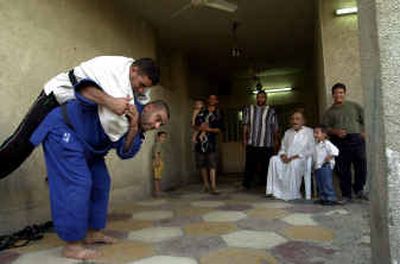Shouldering the load

BAGHDAD, Iraq — Haidar Ali Lazem doesn’t fear much on the mat. Iraq’s Olympic hopeful in judo has won 13 championships and dreams of winning a medal at the Athens Games.
Off the mat is another story.
While other Olympic athletes worry about eating right, getting enough rest and fine-tuning their training regimes, Lazem and the 30 other Iraqis who will compete at the Games spend much of their time worrying about getting shot, or worse.
“We’re athletes,” said Lazem, who was working out alongside a few boxers at an indoor basketball court. “If it was easy, then there would be no challenge.”
Getting to Athens could be an ordeal for Lazem. To catch a flight to Japan, where he will complete his training, he left Tuesday on a 620-mile drive to Amman, Jordan, a route filled with roadside bombs, mines and bandits.
“I don’t like to complain,” Lazem said, “but things could be better.”
He broke away from the conversation to return to his training, first stretching and then grasping the collar of his partner Udai Tarek Hassan for the start of their grappling session.
Within minutes, both men, and Lazem’s trainer, were drenched in sweat as they practiced foot sweeps and hip tosses. But the sweat wasn’t because of the workout — at least not yet. The temperature rose to more than 110 degrees as steamy air flowed through vents that should have been cooling the court.
Athletes’ equipment — when they have it — isn’t much better. Lazem and some of the boxers lack protective gear. Three of the five boxers were working out in cross-trainers instead of the lightweight boxing boots that support their ankles.
Iraq’s Olympic committee was reinstated by the International Olympic Committee in February, 10 months after it was dismantled following the fall of Saddam Hussein’s regime.
Car bombs and gun battles have been an almost daily occurrence in Iraq, leaving sports far from a priority. The new fears have replaced the ones athletes had under the previous regime.
One of Saddam’s sons, Uday, ran the Olympic committee and ordered athletes jailed and tortured for failing to perform up to his expectations.
Iraqi officials are well aware of how tough it will be to restore national pride to a country emerging from dictatorial rule and war.
“There’s no question that these athletes have a lot to deal with that others don’t,” said Amer Abdel-Jabbar, assistant to the secretary general of the Iraq Olympic Committee. “These are difficult times for the country, and it’s hard for them to concentrate on their training when they’re worried about getting back home early because of the security situation here.”
Iraq has won only one Olympic medal, a weightlifting bronze at the 1960 Rome Games.
Most of Iraq’s Olympians going to Athens — primarily the men’s soccer team, two sprinters, a boxer, a swimmer, a weightlifter, one in taekwondo and Lazem — have been given financial assistance by other sports groups and have trained outside the country.
For example, boxer Najah Ali Salah is training in the United States. Other countries hosting Iraq’s Olympians include Canada, Egypt, Germany, Jordan and South Korea.
“We wanted to send them to training camps in the most appropriate locations. Korea obviously is strong in taekwondo and the United States turns out great boxers,” Abdel-Jabbar said.
Lazem hopes to gain valuable experience training in Japan.
“Everything is possible,” Lazem said. “I’m hoping to bring one back for Iraq. But I think also that our being there as a new country is a victory in of itself.”